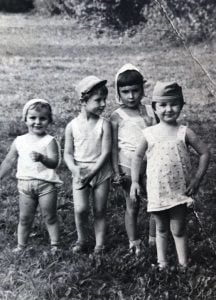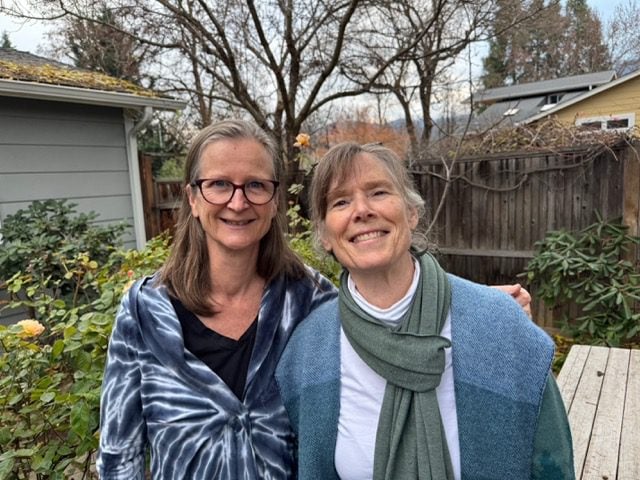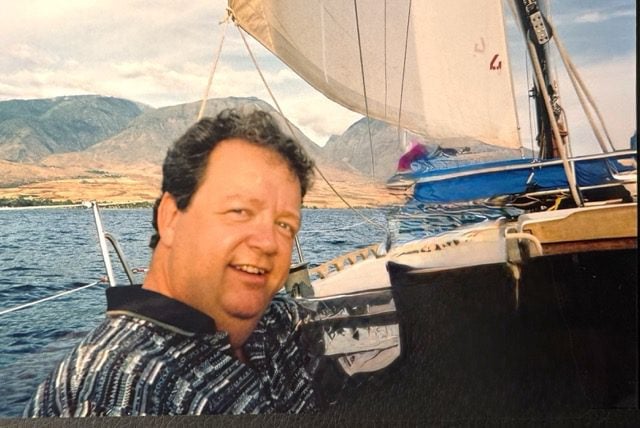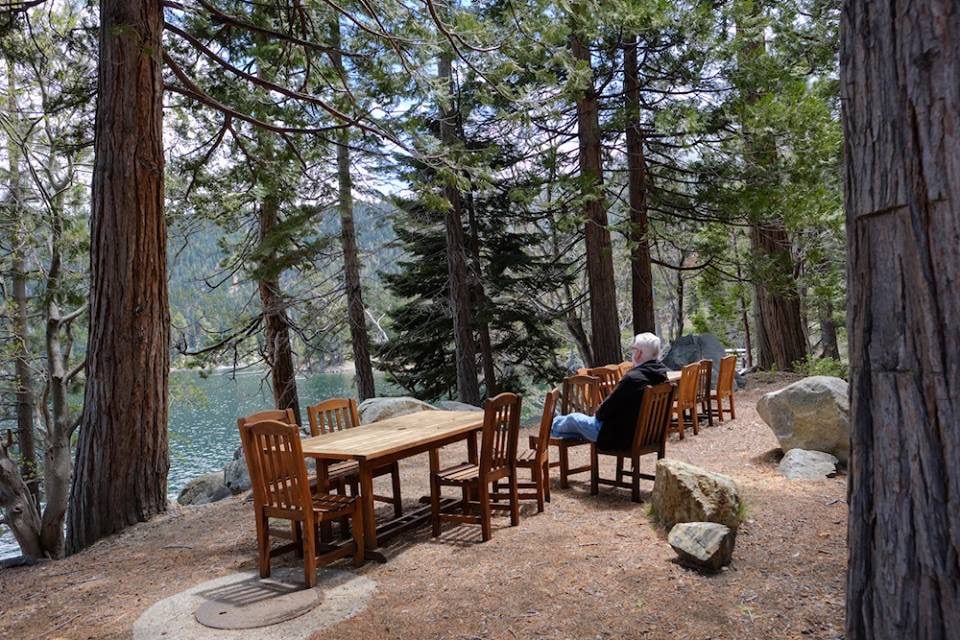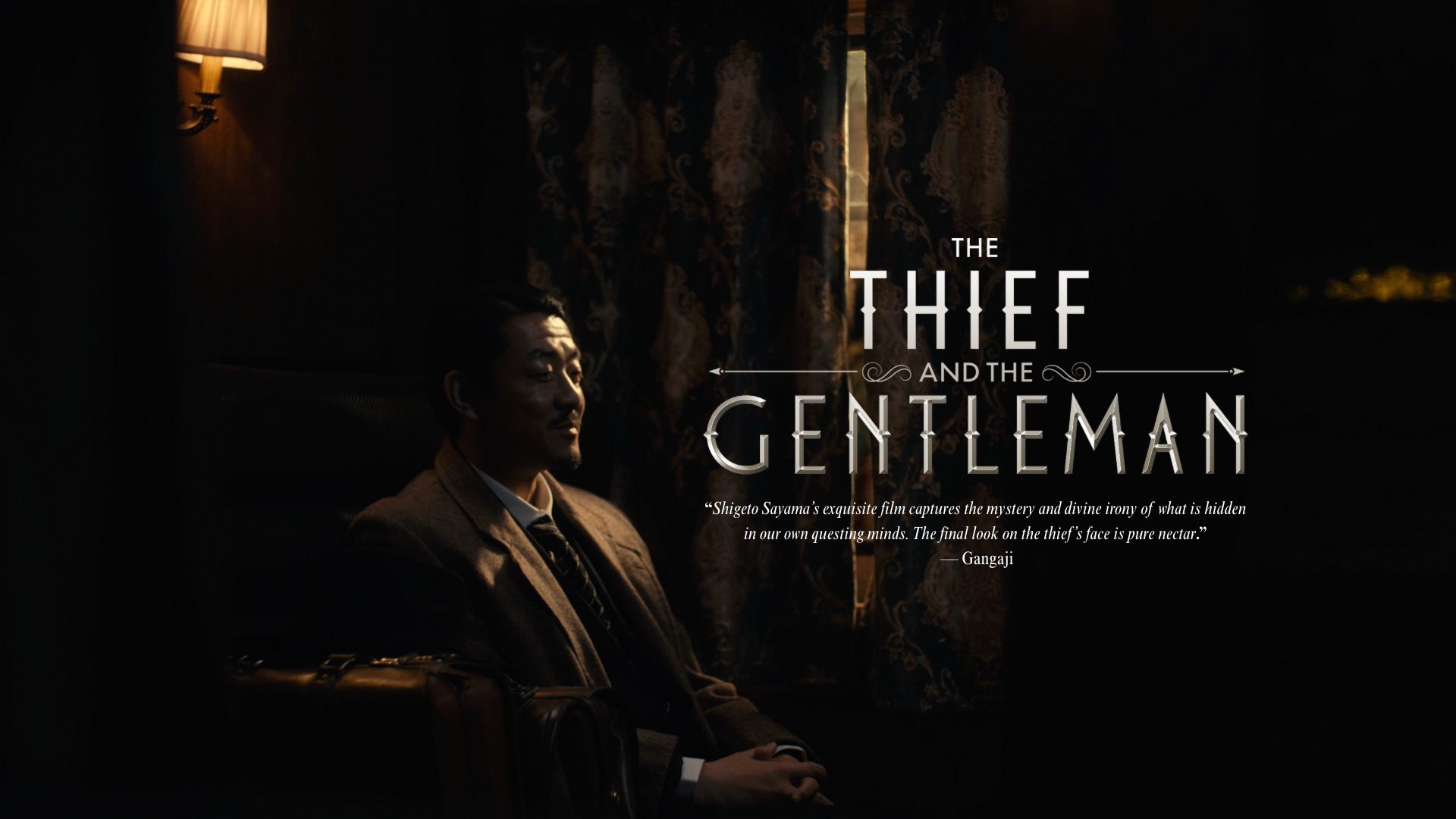An extraordinary story from Sukhita Derova. From being a worker in a Soviet military factory to sitting at Gangaji's feet in New Zealand, beyond all else this journey shows us that when you really have to find out who you are, whatever it takes, the desire for freedom will bring you home.
It was pure joy to get to know Sukhita during our interview. Her deep commitment to the awakening of all being shines through with warmth and playful openness... and a great Russian accent!
My name is…
I was born in Moscow in 1970.
My parents are engineers.
These were some of the sentences I had to learn to pass my high school English class. The deal with the teacher was that I could pass the class by answering questions about myself with 10 prearranged sentences, as long as I did not actually attend the class. Learning English made no sense to me, and I was constantly disruptive. Our English teacher had never been outside of Soviet Union, and none of us had ever seen a foreign person, let alone spoken to one. We were being taught English through a filter of propaganda. It was the language of our enemies, so we learned how to speak about the Great October Revolution and Lenin’s life in English rather than how to order a cup of coffee or find the railway station.
S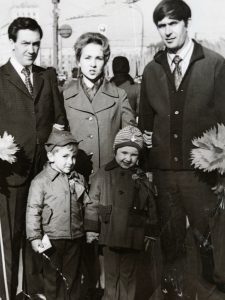 o naturally when I finished school I did not speak much English! But from the age of 12 I had been enrolled in a training program for competitive cyclists. It was my way of not being left at home by myself. Both my parents were working and my mother also was studying in the evenings at University. Cycling gave me an opportunity to travel around the Soviet Union. We had sport camps in Uzbekistan, Estonia, Georgia, and the Ukraine. I was part of a youth team who were being trained to take part in the upcoming Olympic Games. I also loved cycling because it gave me a sense of relative freedom.
o naturally when I finished school I did not speak much English! But from the age of 12 I had been enrolled in a training program for competitive cyclists. It was my way of not being left at home by myself. Both my parents were working and my mother also was studying in the evenings at University. Cycling gave me an opportunity to travel around the Soviet Union. We had sport camps in Uzbekistan, Estonia, Georgia, and the Ukraine. I was part of a youth team who were being trained to take part in the upcoming Olympic Games. I also loved cycling because it gave me a sense of relative freedom.
As I had finished my schooling I needed to get a sports-related job to be able to keep my government financial support. I ended up working in a military factory. I thought I had applied to work in a factory that made table lamps and small household appliances. I thought I was to be an exercise instructor for the workers during lunch breaks and organize sport activities after work. After I applied for the job, I was told they would need to vet me, and my application was put on hold for a month. At the end of this time I was “cleared,” and so I signed the papers. Only then did I learn that I was actually being employed in a military manufacturing plant. I was assigned as a supplier to a team of 33 specialists who were assembling radio location equipment for submarines. I was 17 years old.
When I objected to this situation, I was told it was too late. I had been recruited, and the only way I could leave at that stage was to enroll in University. At the time that was not an option.
Joining the Workers
So at 17 I started working. It was a 10,000 person operation. I had to report every morning by 6:45am. To get to work I took a bus at 5:45am from Moscow to the Industrial Estate. In winter it could be -30 degrees outside. Sometimes the buses were too full and I’d have to wait for the next one. When I got to the factory I would clock in by hanging my number on a nail. The security guards closed the gates at 6:45am sharp so they could see who was late.
One morning I did arrive a few minutes late and there were three men waiting for me. They took me into a soundproof chamber and sat me in the middle of them, so that I was not facing anybody in particular, but at all the times there was someone at my back. I was given a really hard lecture about the Mother Land and commitment and discipline. It was extreme for me to be confronted by such unnecessary intimidation. I was in a bit of shock.
But in general I had fun. I had a little electric cart to drive around. My job was to collect different electronic components and bring them to the high profile workers who assembled the electronic equipment. Nothing had names. The equipment and the different departments were all given long lines of numbers so the job was deciphering these codes. My young mind was fresh and fast, and I found it enjoyable. I was working with people who had been in this factory all their lives and that was a very scary prospect for me.
Living in Violent Times
 As I didn’t want that to be my fate, I realized I needed to get out of there. So I began to prepare myself for university. First I was accepted into St. Petersburg University for film making and moved there. Although I enjoyed the studies, life became very difficult. I was living in student housing which was dominated by some kind of Central Asian drug cartel. I had some close calls there, as I was not prepared to conform to their violent dominance. So I returned to Moscow and in 1990 I enrolled in Moscow State University as a student in psychology. I had to study very hard to get in as the University was only accepting 30 out of 800 applicants for this course.
As I didn’t want that to be my fate, I realized I needed to get out of there. So I began to prepare myself for university. First I was accepted into St. Petersburg University for film making and moved there. Although I enjoyed the studies, life became very difficult. I was living in student housing which was dominated by some kind of Central Asian drug cartel. I had some close calls there, as I was not prepared to conform to their violent dominance. So I returned to Moscow and in 1990 I enrolled in Moscow State University as a student in psychology. I had to study very hard to get in as the University was only accepting 30 out of 800 applicants for this course.
The late 80s and early 90s were very active, intense, and vibrant times in Russia. It was the time of Perestroika and Glasnost. Russia opening up to the West. We all wanted to live like Americans. But what mainly came from the USA, at least at first, were violent action movies. Suddenly it was as if we were all living in a gangster film. This was a very hectic and violent period. Many people were killed. If you go to cemeteries in Moscow today you will see many rows of young men’s graves who died at that time.
People were struggling to grasp the ethics of business relationships and ownership. The identity of the tradesmen didn’t exist on an individual level and criminals started to control the absurd process of dividing up the collective property into personal ownership. This was happening both at the National level with the oligarchs, as well as at the local level. It was bloody.
Disillusionment and Rebirth
On the one hand I was living through these times fully aware of the craziness of my external world, and on the other hand I was studying a form of psychology that was still very much rooted in the idealization of Lenin’s version of Marxism – a set of ideas which devalued the individuality of people and had brought this country to this craziness. I was an ambitious student and wrote a couple of articles that were published. But I was frustrated because nobody could tell me what the subject of psychology was. What I was really interested in was exploring the relationship between the body and the mind.
So I dropped out of university, and decided that I would study this in my own way. I signed up for a 4-year Yoga course, only to discover that underneath the long hours of practice was the same mentality: If you don’t do what you’re taught, then the whole Universe will punish you. I recognized the same collective conditioning. Yoga was definitely not about relaxation. It was being taught on the level of fear.
I was now twenty-two years old, and I didn’t know what to do with myself or what my life was about. I was deeply frustrated and disillusioned. That was when somebody asked me to pass along a book....
We didn’t really have any spiritual books in Russian at this time. Instead people would privately translate a book and make Xerox copies. These copies would be passed around from person to person. By chance I was asked to deliver a copy of a book by Osho called Life, Love, Laughter to someone. This was the very first time I’d had any contact with a text that talked about consciousness in an interesting way. It had been Xeroxed so many times that there were huge gaps in the text. It was a mystery because you read a little bit and then it disappeared. I just so much wanted to know what was in the part that was missing.
Not long after this, I heard that someone was offering an evening class where they would share some Osho meditations, so I went along. It was amazing to be invited to express and experience emotions, and to spend time in silence with each other. It was very powerful to meet other young like-minded people who were asking the same questions as I was.
Then I heard that one woman from St. Petersburg who had been in Poona, India, and was trained as a therapist, was offering a 10-day “Born Again” workshop. The workshop took place in an empty summer holiday resort in the countryside close to St Petersburg. It was a very basic set up. None of us had any money, not even enough for food. There were two local women who would go out into the forest every day and collect berries and mushrooms and different roots and herbs to cook our food. This was a really beautiful and powerful experience, like some kind of initiation. It was the first time that I had an experience of meeting myself as awareness. I was able to inquire from there into the nature and the mechanism of conditioning.
Why am I here?
 The question Russians ask themselves is usually not “Who am I?” but rather “Why am I here?” The absurdity of day-to-day reality was always in direct contradiction with what your intelligence was telling you. In trying to makes sense of it you met only impossibility, and an absence of common sense. So, to go to meditation retreats, which were very rare, was a way to meet others, connect and be playful, and share with one another on the level of humor. It was a way of coping with the everyday reality of life.
The question Russians ask themselves is usually not “Who am I?” but rather “Why am I here?” The absurdity of day-to-day reality was always in direct contradiction with what your intelligence was telling you. In trying to makes sense of it you met only impossibility, and an absence of common sense. So, to go to meditation retreats, which were very rare, was a way to meet others, connect and be playful, and share with one another on the level of humor. It was a way of coping with the everyday reality of life.
During another workshop call “Mystic Rose,” which took place in Minsk in Belorussia, we spent a whole week laughing for 4 hours a day. I spontaneously started to whirl. I didn’t know anything about Sufism or whirling dervishes, but somebody told me that there were people who did whirling meditation. So I thought I would like to meet them. I traveled to Kyrgyzstan to join an Osho Sufi camp. There were around 20 to 30 people from Germany, Italy, England, and USA gathered together in the mountains.
That was the first time I met Western people. They all looked like movie stars to us Russians. They all had nice haircuts, knew how to dress and behave, and they had a certain embodied charisma, especially the Western Sanyasins. They had such good jackets and shoes, colorful tents, yoga mats, and special equipment to brew their coffee. All I had was two pairs of jeans, four t-shirts and three pairs of socks. We had a very different measure of normality. But I think they were very touched by the innocence, heartfulness, and the playfulness of the Russians. We were happy to see each other, and we were curious about each other.
A First Taste of Freedom
 One German man at the camp had a Sony Walkman and some audio tapes from India. I had never seen such a thing, and I was very curious. At night we would sit around the campfire and listen to the Walkman. We had a translator in the camp who spoke English and Russian, and he would translate what was on the tapes for everyone. He would put the tape in the player, listen, press “pause,” and then translate. I didn’t know it at the time, but for the first time I was listening to Papaji. As he spoke in a deep manly voice, the translator would use a deep voice. There was a woman on the tape, too, so the translator would speak in a high voice for the woman. It was both funny and profound.
One German man at the camp had a Sony Walkman and some audio tapes from India. I had never seen such a thing, and I was very curious. At night we would sit around the campfire and listen to the Walkman. We had a translator in the camp who spoke English and Russian, and he would translate what was on the tapes for everyone. He would put the tape in the player, listen, press “pause,” and then translate. I didn’t know it at the time, but for the first time I was listening to Papaji. As he spoke in a deep manly voice, the translator would use a deep voice. There was a woman on the tape, too, so the translator would speak in a high voice for the woman. It was both funny and profound.
There was no electricity at the camp so we would gather round the fire to eat our food and listen. While the tape was playing we would all carry on eating, being careful not to scrape with our metal, military-style bowls and spoons. When the tape was paused, our spoons would stop in mid-air as we listened to the translation, and then we would eat again. That was how I first attended satsang, in a campsite somewhere in the remote mountains of Kyrgyzstan.
Papaji was speaking about freedom. This was really thrilling for me. “Freedom is your internal aspect.” That is what I heard, and it was totally revolutionary. Freedom had been spoken about so much in my life: fight for freedom, march for freedom, die for freedom. My entire cultural conditioning as a member of the proletariat, the entire purpose of revolution and hardship, had been about getting freedom. Suddenly freedom was transformed into an internal aspect of my life. That was so revolutionary.
When Papaji asked the woman, “What is your experience now?” the campsite was totally quiet, waiting for the answer. She answered, “Freedom.” Whoa! That really blew me away. It was that simple! Freedom was right here.
I was young and innocent but finally something started to make sense, and I felt a human connection with people of other countries. I also heard from Osho the invitation to take responsibility for my own life. That meant to make my own choices, follow my heart, live creatively, and trust life. I didn’t need to be in service to my conditioning. This was good news.
Leaving Russia
 Westerners started to come to the camps more and more often and we became friends. Together we organized Sufi workshops and whirling performances in Moscow and on the Winter Palace Square in St. Petersburg where the revolution happened and many people were killed. The purpose of these performances was to invite people to turn their attention inside and finding something which doesn’t move. It was another kind of revolution – a revolution of the heart.
Westerners started to come to the camps more and more often and we became friends. Together we organized Sufi workshops and whirling performances in Moscow and on the Winter Palace Square in St. Petersburg where the revolution happened and many people were killed. The purpose of these performances was to invite people to turn their attention inside and finding something which doesn’t move. It was another kind of revolution – a revolution of the heart.
Eventually I started to travel out of Russia to take part in workshops in different countries like Finland, the Czech Republic, and Germany. Being a Russian citizen made it hard to get a visa for these countries. I would spend four days standing in line at the German embassy in winter in order to leave Russia just for a month. Finally, some members of the Sufi group decided to move to New Zealand, and I was invited to come along. I didn’t know much about New Zealand, but I was very excited to go.
Going it Alone
Moving to another country was a huge eye-opener. Observing the structure of a different society helped me to look into layers of my own cultural, collective, and personal conditioning.
Once we were settled in New Zealand, some of the Germans in our group decided to buy land and establish a communal living center. It soon became apparent to me that living in this commune didn’t feel right for me. Just as I had not been able to continue in the military factory, or live in the house controlled by a drug cartel, or subject myself to the rigid professors in the university, or the fanatical yoga instructors, so I also found I could not continue in this atmosphere.
It felt like I was being controlled by a certain spiritual subculture. It became about “us” and “the outside world,” and we were special. If somebody didn’t react very gracefully for their own reason, the whole group would punish them by distancing themselves. It became a fear-based environment. I couldn’t see why there had to be so much hostility and manipulation involved in the desire for people to wake up.
Some friends and I tried to address this with the group. It was not well received. I was expelled, and once again I was without a community, by myself, this time in another country far from home.
Living in New Zealand my training, language, and education didn’t mean anything, and I had to start over. It was definitely a difficult moment for me. I was heartbroken and disillusioned again because I really loved these people, but I knew this kind of dynamic did not serve. But it was probably one of the best things that could of have happened because then I could face what I actually wanted, and find out how I could become part of what is deeper than a group of friends. I had to step away to see that.
I started to live a normal life, to work and use the skills I had learned along the way. I had to figure everything out for myself, and I enjoyed it. I created my family business, which started in a small garage. Years later our company INNATURE, employs ten people making custom-made furniture out of sustainable timber and organic natural mattresses and bedding.
A Sense of Failure
At the same time I still had this profound sense of questioning: “What is all this for?” “Why I am here?” I felt like I had failed. I didn’t get enlightened like I wanted. I was disappointed. During all these years of meditating and whirling and dancing, I had had an amazing time – beautiful music, good food, good parties, traveling to unique places and many spiritual experiences. It was wonderful. But still I felt unfulfilled. Something was missing.
I believed that I needed to deserve enlightenment. I needed to give myself 100% to get it, and if I had failed, that meant there was something I had held back. I didn’t give enough love, or I didn’t pray enough or dance enough.
So I prayed deeply. How can I get so lost that the ego will never find me?
This inquiry was so profound that I would just have to stop and sit with it. What is really most important in this moment? What do I really want?
The Real Thing
In 2009 one of my Russian friends told me that Gangaji was coming to New Zealand. Gangaji is actually well known in Russia. Her videos have been translated and some were subtitled. So I knew who she was and I had seen a few videos. But I was very surprised to hear that she would come to New Zealand. Why would she come to this sleepy paradise? It is a very comfortable country, sweet and beautiful. I thought that for a spiritual search you needed to have a certain level of discomfort and an intensity of suffering.
I concluded that whoever was coming could not actually be the real Gangaji, but an imitation or a fraud. How could it possibly be the real Gangaji? My Russian friends agreed with me, but we went along just to have a look.
Of course it was Gangaji!
She was so profound. I don’t know how to describe my experience. I have never been able to talk about that meeting because I don’t know what to say. My English vocabulary was not good enough at that time to understand everything she was saying, but I just felt so deeply touched.
Since that time I have been attending workshops and retreats with Gangaji and Eli. I have traveled all over the world because I want to meet everybody in this sangha.
I am so very grateful to Gangaji for her profound invitation to stop the search and to discover what is really here. I am so very grateful to Eli for his sharing of skills and tools to unveil all levels of conditioning – cultural, collective, personal, and egoic.
Life Is Meaningless, but This Moment Is Not!
If I try to comprehend being born in Moscow and growing up in communal flat in the rigid society dominated by fear, watching propaganda on TV about the West, and at the same reflect on the life I find myself living now, it seems impossible that both could be held in the space of one lifetime. I could never have planned any of this. How did I end up in New Zealand sitting with Gangaji? It is a miracle and I have such gratitude for everything I experienced.
Today I am very involved with the work of the Leela School, and this is a beautiful and inspiring time in my life. It is a unique opportunity to be in service in a very true way. It is what makes me happy – to devote my life to being in service to awakening to the truth of the self.
Recently during the session, a woman was sharing with me that she had a deep sense that life is meaningless. I agreed with her: “Yes, it is possible that life is meaningless, but THIS moment is not. In this moment there is an opportunity to realize your true nature, which is love and freedom.”
I now know why I am here.


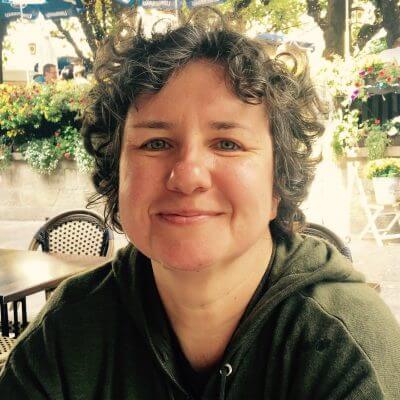
 o naturally when I finished school I did not speak much English! But from the age of 12 I had been enrolled in a training program for competitive cyclists. It was my way of not being left at home by myself. Both my parents were working and my mother also was studying in the evenings at University. Cycling gave me an opportunity to travel around the Soviet Union. We had sport camps in Uzbekistan, Estonia, Georgia, and the Ukraine. I was part of a youth team who were being trained to take part in the upcoming Olympic Games. I also loved cycling because it gave me a sense of relative freedom.
o naturally when I finished school I did not speak much English! But from the age of 12 I had been enrolled in a training program for competitive cyclists. It was my way of not being left at home by myself. Both my parents were working and my mother also was studying in the evenings at University. Cycling gave me an opportunity to travel around the Soviet Union. We had sport camps in Uzbekistan, Estonia, Georgia, and the Ukraine. I was part of a youth team who were being trained to take part in the upcoming Olympic Games. I also loved cycling because it gave me a sense of relative freedom.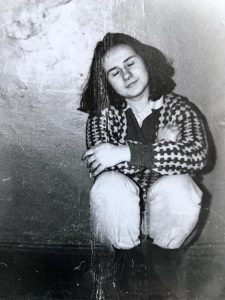 As I didn’t want that to be my fate, I realized I needed to get out of there. So I began to prepare myself for university. First I was accepted into St. Petersburg University for film making and moved there. Although I enjoyed the studies, life became very difficult. I was living in student housing which was dominated by some kind of Central Asian drug cartel. I had some close calls there, as I was not prepared to conform to their violent dominance. So I returned to Moscow and in 1990 I enrolled in Moscow State University as a student in psychology. I had to study very hard to get in as the University was only accepting 30 out of 800 applicants for this course.
As I didn’t want that to be my fate, I realized I needed to get out of there. So I began to prepare myself for university. First I was accepted into St. Petersburg University for film making and moved there. Although I enjoyed the studies, life became very difficult. I was living in student housing which was dominated by some kind of Central Asian drug cartel. I had some close calls there, as I was not prepared to conform to their violent dominance. So I returned to Moscow and in 1990 I enrolled in Moscow State University as a student in psychology. I had to study very hard to get in as the University was only accepting 30 out of 800 applicants for this course.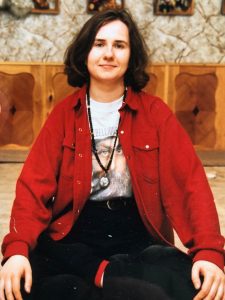 The question Russians ask themselves is usually not “Who am I?” but rather “Why am I here?” The absurdity of day-to-day reality was always in direct contradiction with what your intelligence was telling you. In trying to makes sense of it you met only impossibility, and an absence of common sense. So, to go to meditation retreats, which were very rare, was a way to meet others, connect and be playful, and share with one another on the level of humor. It was a way of coping with the everyday reality of life.
The question Russians ask themselves is usually not “Who am I?” but rather “Why am I here?” The absurdity of day-to-day reality was always in direct contradiction with what your intelligence was telling you. In trying to makes sense of it you met only impossibility, and an absence of common sense. So, to go to meditation retreats, which were very rare, was a way to meet others, connect and be playful, and share with one another on the level of humor. It was a way of coping with the everyday reality of life.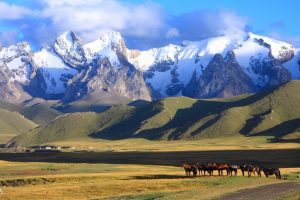 One German man at the camp had a Sony Walkman and some audio tapes from India. I had never seen such a thing, and I was very curious. At night we would sit around the campfire and listen to the Walkman. We had a translator in the camp who spoke English and Russian, and he would translate what was on the tapes for everyone. He would put the tape in the player, listen, press “pause,” and then translate. I didn’t know it at the time, but for the first time I was listening to Papaji. As he spoke in a deep manly voice, the translator would use a deep voice. There was a woman on the tape, too, so the translator would speak in a high voice for the woman. It was both funny and profound.
One German man at the camp had a Sony Walkman and some audio tapes from India. I had never seen such a thing, and I was very curious. At night we would sit around the campfire and listen to the Walkman. We had a translator in the camp who spoke English and Russian, and he would translate what was on the tapes for everyone. He would put the tape in the player, listen, press “pause,” and then translate. I didn’t know it at the time, but for the first time I was listening to Papaji. As he spoke in a deep manly voice, the translator would use a deep voice. There was a woman on the tape, too, so the translator would speak in a high voice for the woman. It was both funny and profound.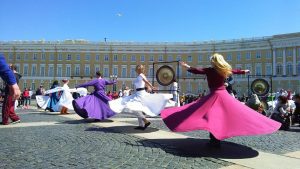 Westerners started to come to the camps more and more often and we became friends. Together we organized Sufi workshops and whirling performances in Moscow and on the Winter Palace Square in St. Petersburg where the revolution happened and many people were killed. The purpose of these performances was to invite people to turn their attention inside and finding something which doesn’t move. It was another kind of revolution – a revolution of the heart.
Westerners started to come to the camps more and more often and we became friends. Together we organized Sufi workshops and whirling performances in Moscow and on the Winter Palace Square in St. Petersburg where the revolution happened and many people were killed. The purpose of these performances was to invite people to turn their attention inside and finding something which doesn’t move. It was another kind of revolution – a revolution of the heart.